新概念英语第一册第67-68课课件(共41张PPT)
合集下载
新概念一L67-68ppt

from school today. 5.Thursday is between W_e_d_n_e_s_d_a_yand Friday.
7
8
二、Text
9
请欣赏音图动漫!(twice)
1. How’s Jimmy today? Key: He’s very well.
2. What are the Johnsons going to do
too
Were you at the butcher’s,
?
MRS. JOHNSON: NHoo,w’I swasn’t. I was at the
greengrocer’s.
Jimmy today? well
MRS. WILLIAMS: He’s veraybsent from , thank you.
Sam: No, 1__I___w_a_s_n_’___t
Nick: Where were you? Sam: I was in the office. Nick: Were you absent last week?
Sam: Yes, 2___I__w_a_s____ Nick: How 3__w_e_r_e__y__o_u_?
Thu,rsday
Wednesday and
.
How are you all keeping?
MRS. JOHNSON: Very well, thadnakysyou. country We are going to spend thrmeoether’s in weekend
the
F.riday
We arceougnotirnyg to stay at my
the
.
7
8
二、Text
9
请欣赏音图动漫!(twice)
1. How’s Jimmy today? Key: He’s very well.
2. What are the Johnsons going to do
too
Were you at the butcher’s,
?
MRS. JOHNSON: NHoo,w’I swasn’t. I was at the
greengrocer’s.
Jimmy today? well
MRS. WILLIAMS: He’s veraybsent from , thank you.
Sam: No, 1__I___w_a_s_n_’___t
Nick: Where were you? Sam: I was in the office. Nick: Were you absent last week?
Sam: Yes, 2___I__w_a_s____ Nick: How 3__w_e_r_e__y__o_u_?
Thu,rsday
Wednesday and
.
How are you all keeping?
MRS. JOHNSON: Very well, thadnakysyou. country We are going to spend thrmeoether’s in weekend
the
F.riday
We arceougnotirnyg to stay at my
the
.
新概念英语第一册第67-68课课件
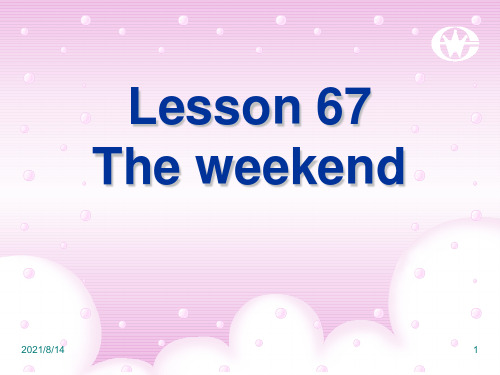
反身代词 myself himself herself itself ourselves
themselves yourselves
2021/8/14
2
Discussion
What did you do on weekend ?
The weekend
go shopping
shopping list
2021/8/14
4
❖ greengrocer ❖ absent ❖ Monday ❖ Tuesday ❖ Wednesday ❖ Thursday ❖ keep ❖ spend ❖ weekend ❖ Friday ❖ Saturday ❖ Sunday ❖ country ❖ lucky
2021/8/14
❖ ② n. 乡下,乡村 ❖ the country = the countryside 乡下 ❖ country表示“农村”时,前面一定要加定冠词the。 ❖ ③ adj. 乡下的;乡村风味的
I prefer country life to life in the city. 乡村生活与城市生活相比,我更喜欢乡村生活。
◆afford 人作主语,支付得起,腾出时间 I can’t afford it.
eg: I want to have a picnic with some of my friends, but they can’t afford some time for me. ◆take [花时间] It takes sb. some time to do sth. eg:It took me 3 hours to explain this plan.
单词学习
n. 蔬菜水果零售商 adj. 缺席的 n. 星期一 n. 星期二 n. 星期三 n. 星期四 v. (身体健康)处于(状况) v. 度过 n. 周末 n. 星期五 n. 星期六 n. 星期日 n. 乡村 adj. 幸运的
新概念英语NCE1_lesson67-68(共17页)课件

❖ 介词at可表示地点,通常用于某个小地点之前: ❖ at the bus-stop 在公共汽车站 ❖ at the railway station在火车站 ❖ at school 在学校 ❖ at home在家
❖ (2)介词on用于周和月份中的任何一天 之前。
❖ 通常使用介词 on表示星期几(如 on Monday在星期一)、一天中的某段时间 (如 on Monday morning在星期一早上)、 日期(如 on April 1st在4月1日)、星期几 +日期(如 on Monday,April 1st在4月1日, 星期一)、具体时间(如 on that day在那 一天)、周年纪念日(如 on your birthday 在你的生日)以及节日(如 on Christmas Day在圣诞节)等。
Lesson 68 what’s the time ?
New Words
church 教堂 dairy 乳品店 baker 面包师傅 grocer 食品杂货店
Key structures
-Where were you on Monday? -I was in GZ.
-When were you at the office? -9:00 pm last night.
was is
(He, She, It)
第二人称单数,复数 are were
(You)
Exercise
❖ 他们昨天在北京。 ❖ 他去年还是个学生。 ❖ 你昨晚在家吗? ❖ 你们上午在哪儿?
用介词at, on和in的时间短语
❖ (1)用介词 at的时间短语通常可表示:确切的时间(如 at 10 o' clock 10点钟时),用餐时间(如 at lunchtime午餐 时),其他时刻(如 at noon中午时),年龄(如 at the age of 27 27岁时)等。
❖ (2)介词on用于周和月份中的任何一天 之前。
❖ 通常使用介词 on表示星期几(如 on Monday在星期一)、一天中的某段时间 (如 on Monday morning在星期一早上)、 日期(如 on April 1st在4月1日)、星期几 +日期(如 on Monday,April 1st在4月1日, 星期一)、具体时间(如 on that day在那 一天)、周年纪念日(如 on your birthday 在你的生日)以及节日(如 on Christmas Day在圣诞节)等。
Lesson 68 what’s the time ?
New Words
church 教堂 dairy 乳品店 baker 面包师傅 grocer 食品杂货店
Key structures
-Where were you on Monday? -I was in GZ.
-When were you at the office? -9:00 pm last night.
was is
(He, She, It)
第二人称单数,复数 are were
(You)
Exercise
❖ 他们昨天在北京。 ❖ 他去年还是个学生。 ❖ 你昨晚在家吗? ❖ 你们上午在哪儿?
用介词at, on和in的时间短语
❖ (1)用介词 at的时间短语通常可表示:确切的时间(如 at 10 o' clock 10点钟时),用餐时间(如 at lunchtime午餐 时),其他时刻(如 at noon中午时),年龄(如 at the age of 27 27岁时)等。
Lesson67-68(课件)新概念英语第一册
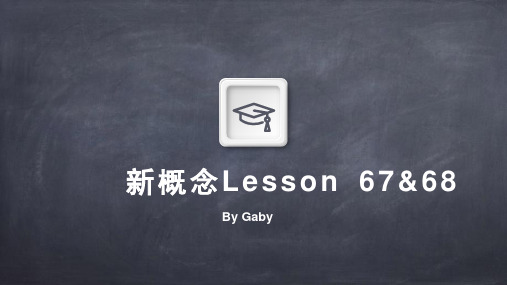
1. 一般现在时 经常的状态 主语 + is/am/are +非动词 习惯的动作 主语 + 动词(原型/三单) 真理
一般过去时 过去经常的状态 主语 + was(is/am)/were +非动词 过去习惯的动作 主语 + 动词过去式
2. How’s Jimmy today? ’s = is/was/has
/
Where were you on...? (Sunday, January 1st) ...你在什么地方? I was at..., on...
When were you at ...? 你什么时候在......? I was at....,on...
书面练习B Examples: he/church/Sunday When was he at church? He was at church on Sunday.
6. weekend /'wi:kend/ n. 周末 week + end
7. country /kʌntri/ n. 乡村 - countries in the country in the city 在城里 in the village 在村里 in the town 在城镇
8. lucky /'lʌki/ adj. 幸运的 luck n. 运气 不可数 Good luck! 祝好运! You are so lucky! You are a lucky dog! 幸运儿
新概念Lesson 67&68
By Gaby
课文笔记复习+作业讲解:
1. greengrocer /'gri:n'grəusə/ n. 蔬菜水果零售商 at the greengrocer’s (shop) 在蔬菜水果零售店 at the butcher’s (shop) 在肉店 at the hairdresser’s (shop) 在理发店 at the stationer’s (shop) 在文具店 at the doctor’s (office) 在诊所 at my father’s (house) 在我父亲家
Lesson 67-68 The weekend(课件)-新概念英语第一册
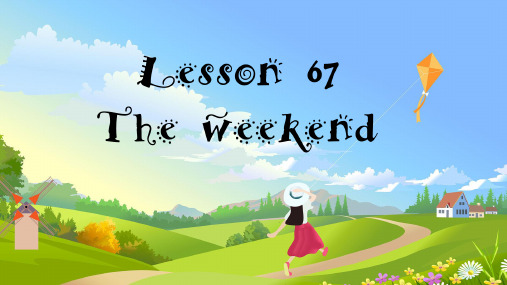
如: last... 上一个...... ...ago ......之前 just now 刚刚 yesterday 昨天, the day before yesterday 前天
be动词的过去式
主语/时态 第一人称单数(I) 第三人称单数 (He, She, It)
现在时 am is
过去时 was
at the greengrocer’s
baker
/ˈbeɪkə/ n.
at the baker’s
at the greengrocer's (shop) at the grocer's at the hairdresser's
在蔬菜水果店 在杂货店 在理发店
at the doctor's (office) at my mother's (house)
Tuesday Friday weekend country baker grocer
Wednesday Saturday spend church keep greengrocer
Which one is appearing?
Saturday
absent country
weekend
greengrocer
Where were you on March 3rd? I was at...
Where were you on April 4th? I was...
Where were you on May 5th? I ...
Where was she on June 6th? She was at...
Friday /ˈfraɪdeɪ/
Saturday /ˈsætədeɪ/ Sunday /ˈsʌndeɪ/ weekend /ˌwiːkˈend/
be动词的过去式
主语/时态 第一人称单数(I) 第三人称单数 (He, She, It)
现在时 am is
过去时 was
at the greengrocer’s
baker
/ˈbeɪkə/ n.
at the baker’s
at the greengrocer's (shop) at the grocer's at the hairdresser's
在蔬菜水果店 在杂货店 在理发店
at the doctor's (office) at my mother's (house)
Tuesday Friday weekend country baker grocer
Wednesday Saturday spend church keep greengrocer
Which one is appearing?
Saturday
absent country
weekend
greengrocer
Where were you on March 3rd? I was at...
Where were you on April 4th? I was...
Where were you on May 5th? I ...
Where was she on June 6th? She was at...
Friday /ˈfraɪdeɪ/
Saturday /ˈsætədeɪ/ Sunday /ˈsʌndeɪ/ weekend /ˌwiːkˈend/
新概念一L67-68ppt课件
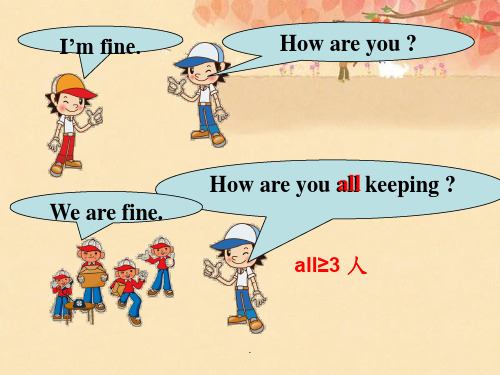
week?
.
MRS. WILLIAMS: Yes, he was. He was absent on Monday, Tuesday, Wednesday and Thursday. How are you all keeping ?
MRS. JOHNSON: Very well, thank you. We are going to spend three days in the country. We are going to stay at my mother’s for the weekend. MRS. WILLIAMS: Friday, Saturday and Sunday in the country! Aren’t you lucky!
at the grocer’s .
随堂补充资料
1. Monday is after S_u_n_d_a_y____. 2. The ba_k_e_r____ can make nice bread. 3. I’m going to s_pe_n_d____ two days in French. 4. Jill has a temperature. She is a_b_s_e_n_t_ from
.
名词篇
MRS. JOHNSON: Hello. Were you at the butcher’s? MRS. WILLIAMS: Yes, I was.
Were you at the butcher’s, too? MRS. JOHNSON: No, I wasn’t. I was at the
.
综合篇
MRS. JOHNSON: Hello.Were you at thebutcher’s? MRS. WILLIAMS: Yes, I was.
.
MRS. WILLIAMS: Yes, he was. He was absent on Monday, Tuesday, Wednesday and Thursday. How are you all keeping ?
MRS. JOHNSON: Very well, thank you. We are going to spend three days in the country. We are going to stay at my mother’s for the weekend. MRS. WILLIAMS: Friday, Saturday and Sunday in the country! Aren’t you lucky!
at the grocer’s .
随堂补充资料
1. Monday is after S_u_n_d_a_y____. 2. The ba_k_e_r____ can make nice bread. 3. I’m going to s_pe_n_d____ two days in French. 4. Jill has a temperature. She is a_b_s_e_n_t_ from
.
名词篇
MRS. JOHNSON: Hello. Were you at the butcher’s? MRS. WILLIAMS: Yes, I was.
Were you at the butcher’s, too? MRS. JOHNSON: No, I wasn’t. I was at the
.
综合篇
MRS. JOHNSON: Hello.Were you at thebutcher’s? MRS. WILLIAMS: Yes, I was.
新概念英语第一册第67-68课课件(共41张PPT)
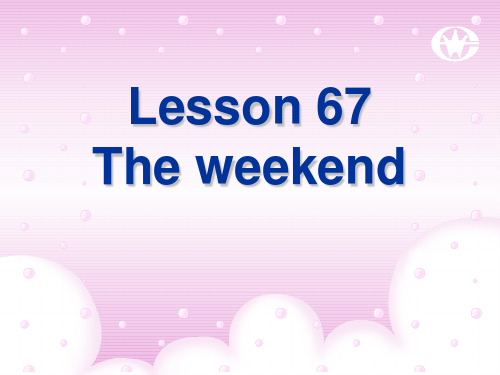
in the country!
Aren't you lucky! ✲ 这句话是否定疑问句形式的感叹句,为的是加强语气。 尽管形式上是否定的,但却表示强有力的肯定。
Grammar
语法
一般过去时(simple past tense) :
过去发生的而现在已经结束的动作要用一般过去时。
基本用法:
1、常用来表示过去某一时间所发生的非持续性动作;
Lesson 67 The weekend
Discussion
What did you do on weekend ?
New Words
greengrocer 蔬菜水果零售商
absent
缺席的
keep
处于、保持
spend
度过
weekend 周末
country
乡村、国家
lucky
幸运的
New Words
5、We played(play的过去式) computer games together. 我们在一起玩了电脑游戏。
6、It ran(run的过去式) after a cat yesterday. 它昨天跑着追赶一只猫。
7、They made(make的过去式) a bookcase for Jim. 他们为Jim做了一个书架。
⑥Miss Zhang was ill 2 days ago. 张小姐前两天病了。
Miss Zhang wasn’t ill 2 days ago. 张小姐前两天没有生病。
一般过去时的句型构成形式:
一、含有系动词(be动词——am/is/are)的一般过去时形式:
✿疑问句: Was /Were + 主语 + …?
Aren't you lucky! ✲ 这句话是否定疑问句形式的感叹句,为的是加强语气。 尽管形式上是否定的,但却表示强有力的肯定。
Grammar
语法
一般过去时(simple past tense) :
过去发生的而现在已经结束的动作要用一般过去时。
基本用法:
1、常用来表示过去某一时间所发生的非持续性动作;
Lesson 67 The weekend
Discussion
What did you do on weekend ?
New Words
greengrocer 蔬菜水果零售商
absent
缺席的
keep
处于、保持
spend
度过
weekend 周末
country
乡村、国家
lucky
幸运的
New Words
5、We played(play的过去式) computer games together. 我们在一起玩了电脑游戏。
6、It ran(run的过去式) after a cat yesterday. 它昨天跑着追赶一只猫。
7、They made(make的过去式) a bookcase for Jim. 他们为Jim做了一个书架。
⑥Miss Zhang was ill 2 days ago. 张小姐前两天病了。
Miss Zhang wasn’t ill 2 days ago. 张小姐前两天没有生病。
一般过去时的句型构成形式:
一、含有系动词(be动词——am/is/are)的一般过去时形式:
✿疑问句: Was /Were + 主语 + …?
新概念英语第一册第67-68课课件
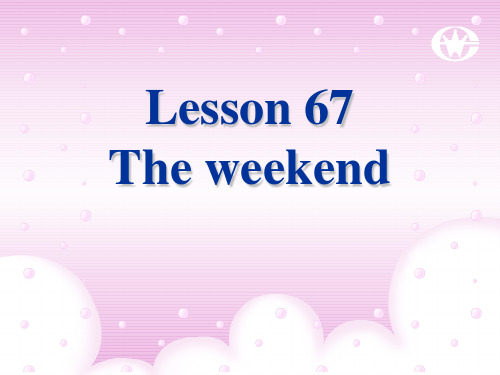
be动词的过去式
主语/时态 第一人称单数 ( I) 第三人称单数 (He, She, It) 第二人称单,复数 (You)第一人称、第三人 称复数we/they 现在时 am was is are were 过去时
is------isn’t
am-------am
not are-------aren’t
= How are you ? 用介词on。 keep v. (身体健康)处于(状况)
♣ MRS.JOHNSON:Very well, thank you. We're going to spend
three daysin the country. We're going to stay at my mother's for the weekend. stay: 短暂的居住。 for the weekend: 整个周末这几天 的时间。 at the weekend 强调时间的某一点
✲ well是形容词,表示身体好
♣ MRS.JOHNSON: Was he absent from school last week? last:上一个 week:周 last week:上周
★ MRS.WILLIAMS: Yes, he was. He was absent on Monday, Tuesday, Wednesday and Tuesday. on:表示在星期几 How are you all keeping?
find out: 有了什么,什么有变化 yesterday am----->was is------->was are------>were
一般过去时
定义:表示过去某个时间发生的动作或者存在
新概念英语第一册第67-68课课件 Liya

thank you.
✲ 也可作副词,修饰动词。 He swims well.
♣ MRS.JOHNSON: Was he ✲ be (动词) absent from:缺席
absent from school last week?
✲ last:上一个 week:周
✲ last week:上周
(1)You were absent/Were + 主语 + …?
e.g. ① I was late yesterday.
昨天我迟到了。
Were you late yesterday? 你昨天迟到了吗?
②You were happy when you were at school. 当你在学 校,你很开心。
Were you happy when you were at school? 你在学校开心吗?
We're going to spend three days ✲ spend:花费
✲ country:
当乡村时,前面要加定冠词the;
in the country.
(1)spend time/money (in) doing something
作为国家时,前面不能加定冠词。 花费时间、金钱做某事
We're
His father and mother weren’t teachers. 他爸爸妈妈以前不是老师
was ill 2 days ago. 张小姐前两天病了。
Mi⑥ssMiZhsasngZhwaasnng’t ill 2 days ago. 张小姐前两天没有
一般过去时的句型构成形式:
一、含有系动词(be动词——am/is/are)的一般过去时形式:
新概念英语NCE1_lesson67-68(共24页)课件

• 我花了400RMB买了一辆新的自行车。 • I spend 400yuan in buying a new bike. • I spend 400yuan on the new bike. • The new bike costs me 400yuan.
Wednesday ,and thurday. from
• We are going to spent three days on the
country. spend
in
• Aren’t you luck!
lucky
Monday Tuesday Wednesday Thursday Friday Saturday Sunday
• We are going to stay at my mother’s for the weekend.
• Mrs.Williams:Friday,Saturday and Sunday in the country! Aren’t you lucky!
Find out the mistakes
• Was you at the butcher’s?
were
• Yes,I were. was
• How are Jimmy today? is
• Was he absent to school last week? from
• How are you all keep? keeping
• He was absent in Monday,Tuesday,
主格 I he she it we they you
宾格 me him her it us them you
…的 my
his her its our their your
Wednesday ,and thurday. from
• We are going to spent three days on the
country. spend
in
• Aren’t you luck!
lucky
Monday Tuesday Wednesday Thursday Friday Saturday Sunday
• We are going to stay at my mother’s for the weekend.
• Mrs.Williams:Friday,Saturday and Sunday in the country! Aren’t you lucky!
Find out the mistakes
• Was you at the butcher’s?
were
• Yes,I were. was
• How are Jimmy today? is
• Was he absent to school last week? from
• How are you all keep? keeping
• He was absent in Monday,Tuesday,
主格 I he she it we they you
宾格 me him her it us them you
…的 my
his her its our their your
新概念英语第一册Lesson 67&68课件
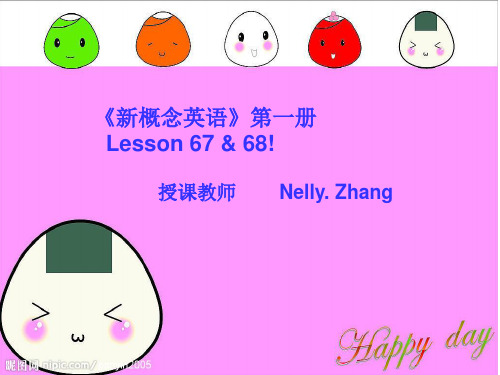
Sunday, January 1st Where was she on…? When was she at church?
at the baker’s
Friday, June 6th Where was she on…? When was she at the baker’s?
Pari work:Ask and answer!
When was Jimmy absent from shcool? He was absent from school on Monday, Tuesday,Wednesday and Thursday. How many days are the Johnsons going to say in the country? They are going to stay there for three days.
现在已经结束的动作。本课学习了带有be动词的一 般过去时。本时态常和有明确表示过去的时间连用。
1.肯定句结构:主语+was/were+...,第一, 第三人称的过去时(am/is)要变为was。 其余的都用were。 was/were 2. 一般疑问句:________提前,其余不 变。 肯定回答:Yes,主语+was/were. 否定回答:No, 主语+wasn't/weren't. not was/were 3.否定句在_________后加______,其余 不变。
Can you retell it?
Homework!
1. Retell the dialogue. 2. Finish the related exercise. 3. Learn the new words by heart.
新概念英语第一册第67-68课课件 Liya

Was he a farmer six years ago? 他六年前是农民吗?
④My friends
were
so sad.
我的朋友们很伤心。 teachers. 张小姐2天前病了。
Were your friends so sad? 你朋友们伤心吗?
⑤His father and his mother were 他爸爸和妈妈以前是老师。 ⑥Miss Zhang was ill 2 days ago.
He wasn’t a farmer six years ago. 他六年前不是一名农民。
④My friends
were
so sad.
我的朋友们很伤心。 teachers.
My friends weren’t so sad. 我的朋友们不伤心。
⑤His father and mother were 他爸爸和妈妈以前是老师。
His father and mother weren’t teachers. 他爸爸妈妈以前不是老师。
⑥Miss Zhang
was
ill 2 days ago.
张小姐前两天病了。
Miss Zhang wasn’t ill 2 days ago. 张小姐前两天没有生病。
一般过去时的句型构成形式:
一、含有系动词(be动词——am/is/are)的一般过去时形式: ✿疑问句: Was /Were + 主语 + …? e.g. ① I was late yesterday. 昨天我迟到了。
Were his father and mother teachers? 他爸爸妈妈以前是老师吗? Was Miss Zhang ill 2 days ago? 张小姐2天前病了吗? 肯定回答:Yes,主语 was/were. 否定回答: No, 主语 wasn’t/weren’t.
④My friends
were
so sad.
我的朋友们很伤心。 teachers. 张小姐2天前病了。
Were your friends so sad? 你朋友们伤心吗?
⑤His father and his mother were 他爸爸和妈妈以前是老师。 ⑥Miss Zhang was ill 2 days ago.
He wasn’t a farmer six years ago. 他六年前不是一名农民。
④My friends
were
so sad.
我的朋友们很伤心。 teachers.
My friends weren’t so sad. 我的朋友们不伤心。
⑤His father and mother were 他爸爸和妈妈以前是老师。
His father and mother weren’t teachers. 他爸爸妈妈以前不是老师。
⑥Miss Zhang
was
ill 2 days ago.
张小姐前两天病了。
Miss Zhang wasn’t ill 2 days ago. 张小姐前两天没有生病。
一般过去时的句型构成形式:
一、含有系动词(be动词——am/is/are)的一般过去时形式: ✿疑问句: Was /Were + 主语 + …? e.g. ① I was late yesterday. 昨天我迟到了。
Were his father and mother teachers? 他爸爸妈妈以前是老师吗? Was Miss Zhang ill 2 days ago? 张小姐2天前病了吗? 肯定回答:Yes,主语 was/were. 否定回答: No, 主语 wasn’t/weren’t.
新概念英语第一册课件Lesson67-68

joke
v. 开玩笑,戏弄,嘲弄 --My brother is always joking.我的兄弟经常开玩笑 --You must be joking.你在开玩笑吧 --I joked with him. 我和他开玩笑 --n. 玩笑
--He sometimes tells jokes. 他有时会说笑话。
not anything
not anybody
not anyone
3.一般情况下,形容词修饰名词时,通常形容词放在名词前面 a beautiful bird 形容词修饰不定代词时,通常形容词放在不定代词之后。 something good, anything wrong 回忆一下enough的用法 动词不定式可以跟在不定代词之后做定语 something to do, nothing to eat
--She is everything to me. 她是我的一切。
anything
pron. 任何东西
(用于疑问句,if从句)任何事 物 (用于否定句)任何东西都(不) --Did you say anything? 你说了些什么吗? --Has anything happened during my absence? 我不在时发生了什么事吗? --Do you want anything to drink? 你想喝点什么? --If there’s anything I can do for you, please tell me. 如果有什么我能帮你的,
1)以人或事为主语时,impossible 不能做表语与不定式连用,必须用少作形式主语。
--It is impossible for him to do it. 要他做那件事是不可能的。 --He is impossible to do it. (错误) 2)it 也可不做主语,而做宾语。 --Illness made it impossible for him to go. / Illness made him impossible to go.生病使他不能去。
新概念一L67-68ppt(推荐完整)
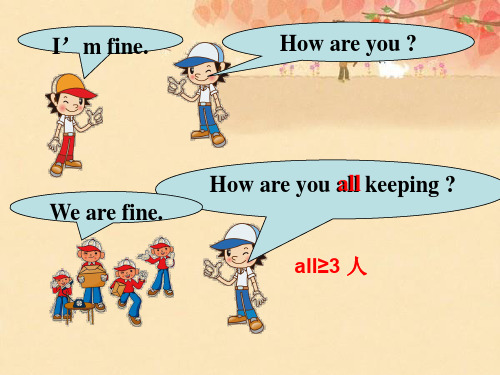
/kVntri/n. country 乡村 表示乡村时前加the in the country 在乡村 /'lVki/adj. lucky 幸运的
/tSE:tS/n. church 教堂 at church 做礼拜 /'deEri/n. dairy 乳品店at the dairy /'beIKE/n. baker 面包师傅 at the baker’s /'grEusE/n. grocer 食品杂货商
at the grocer’s
随堂补充资料
1. Monday is after S_u_n_d_a_y____. 2. The ba_k_e_r____ can make nice bread. 3. I’m going to pse_n_d_____ two days in French. 4. Jill has a temperature. She is a_b_s_e_n_t_ from
school today. 5. Thursday is between We_d__n_e_s_d_a_y and Friday.
二、Text
请欣赏音图动漫!(twice)
1. How’s Jimmy today? Key: He’s very well.
2. What are the Johnsons going to do
We are going to spend three days in the country. We are going to stay at my mother’s for the
weekend.
MRS. WILALIrAeMn’S:t Friday, Saturday and Sunday in the
新概念英语第一册 67-68课 36张PPT
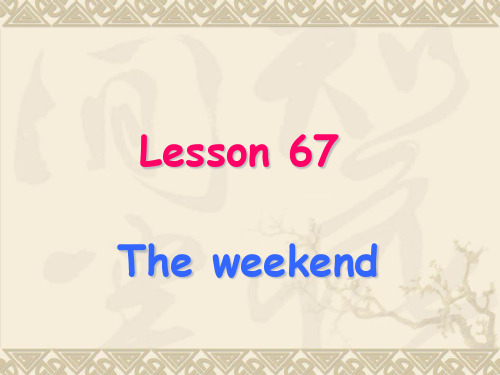
❖
实义动词(有确切含义的动词,可
❖
以单独做谓语,如:played
❖
等)
例如:
❖ They were happy.
❖ He played football.
❖ You did your homework.
动词的过去式变化规则
❖ 1、一般的动词后面直接加-ed
① 清辅音后面加ed,读[t] asked
用括号里动词的适当形式填空。
1. He __________ (read) that book last week.
2. Last night he ___________ (arrive) just in time for the sy) Thomas yesterday.
★ absent [ˈæ bsənt] adj. 缺席的
be absent from …
不在,缺席
be absent from school
be absent from work
★ spend v. 度过 We are going to spend several days at my mother’s. I want to spend my holiday in the country this weekend. Women spend a lot of money on clothes. Children spend a lot of time on Internet. The manager spent 2 hours(in)explaining the plan at the meeting.
10. Last year Frances ___________ (buy) her mother a pretty watch for her birthday.
- 1、下载文档前请自行甄别文档内容的完整性,平台不提供额外的编辑、内容补充、找答案等附加服务。
- 2、"仅部分预览"的文档,不可在线预览部分如存在完整性等问题,可反馈申请退款(可完整预览的文档不适用该条件!)。
- 3、如文档侵犯您的权益,请联系客服反馈,我们会尽快为您处理(人工客服工作时间:9:00-18:30)。
e.g. 1、He played computer games last week. 他上周 玩了电脑游戏。
2、We went to school yesterday.
我们昨天去了学校。
3、They saw a film together last night.
他们昨晚一起看了电影。
2、表示在过去的一段时间内经常或反复发生的动作或存在的状态。 表示过去习惯性、经常性的动作、行为;过去主语所具备的能力和性格。
★ MRS.WILLIAMS: Yes. I was. ✲ was是be动词am/is的过去式。
Were you at the butcher's, too?
♣
MRS.JOHNSON:
No,
I
wasn't.
✲ wasn’t=was not, 和isn’t的过去式。
是am
not
I
was
at
the
greengrocer's.
⑥Miss Zhang was ill 2 days ago. 张小姐前两天病了。
Miss Zhang wasn’t ill 2 days ago. 张小姐前两天没有生病。
一般过去时的句型构成形式:
一、含有系动词(be动词——am/is/are)的一般过去时形式:
✿疑问句: Was /Were + 主语 + …?
④My friends were so sad. 我的朋友们很伤心。
My friends weren’t so sad. 我的朋友们不伤心。
⑤His father and mother were teachers.
他爸爸和妈妈以前是老师。
His father and mother weren’t teachers. 他爸爸妈妈以前不是老师。
❖ He was a baby many year ago.
❖ He is a basketball player now.
一般过去时的句型构成形式:
二、含有实义动词的一般过去时形式: 肯定句: 主语 + 动词过去式 + … 。
e.g. 1、I went(go的过去式) to school this morning. 我今早去了学校。
一般过去时的句型构成形式:
一、含有系动词(be动词——am/is/are)的一般过去时形式:
✿否定句:主语 + was /were + not(wasn’t/weren’t)…。
e.g. ① I was late yesterday. 昨天我迟到了。
I wasn’t late yesterday. 昨天我没有迟到。
一般过去时表示过去某一特定(与现在无关) 的时间,与具体的表示过去的时间状语连用。
如: last year (去年), two days ago(2天 前) , yesterday(昨天) , just now(刚 才), this morning(今天早上), last night(昨晚), the day before yesterday (前天)等。
♣ MRS.JOHNSON:
Very well, thank you. ✲ very well: 身体好。
✲ 主语 + be动词 + going to + 动原:某人/物将要做某事。
We're going to spend three days ✲ spend:花费
✲ country: 当乡村时,前面要加定冠词the; in the country. 作为国家时,前面不能加定冠词。
2、You saw(see的过去式) a film with Betty last night. 你昨晚和Betty一起看电影了。
(2)spend time/money on something
✲ for the weekend: 整个周末这几天 在…方面时间/花钱
for the weekend. 的时间。
e.g. I spend 10 yuan on this book.
★ MRS.WILLIAMS: Friday, Saturday and Sunday
2、You saw(see的过去式) a film with Betty last night. 你昨晚和Betty一起看电影了。
3、He ate(eat的过去式) a burger just now. 他刚才吃了个汉堡。
4、She drank(drink的过去式) some tea 2 hours ago. 她2小时前喝了一些茶。
✲ on:表示在星期几用介词on。 He was absent on Monday,
Tuesday, Wednesday and
✲ and连接几个词语时,
Tuesday.
How are you all keeping? ✲ = How are you ?
and前升调,后降调。 ✲ all 是代词,表示“所有”。 用来指3个或3个以上的人和事物。
③He was a farmer six years ago. 他六年前是一名农民。
Was he a farmer six years ago? 他六年前是农民吗?
④My friends were so sad. 我的朋友们很伤心。
Were your friends so sad? 你朋友们伤心吗?
一般过去时的句型构成形式:
一、含有系动词(be动词——am/is/are)的一般过去时形式:
✿be动词的现在时和过去时的对比
总结:
✿ was(is/am的过去式)用于第一人称单数(I)和第三人称单数 (he/she/it)及所有单数形式;
✿ were(are的过去式)用于所有其它的人称和所有复数后 即:第一人称复数(we)、第二人称单复数(you)、第三人称 复数(they)等。
肯定回答:Yes,主语 was/were. 否定回答: No, 主语 wasn’t/wery years ago. He is a singer now.
❖ She was a girl many years ago.
❖ She is an actor now.
Lesson 67 The weekend
Discussion
What did you do on weekend ?
New Words
greengrocer 蔬菜水果零售商
absent
缺席的
keep
处于、保持
spend
度过
weekend 周末
country
乡村、国家
lucky
幸运的
New Words
Monday (Mon.) 星期一
Tuesday(Tue.) 星期二
Wednesday (Wed.)星期三
Thursday (Thu.) 星期四
Friday (Fri.)
星期五
Saturday (Sat.) 星期六
Sunday (Sun.) 星期日
The weekend 周末
Listen to the tape and answer the question:
一般过去时的句型构成形式:
一、含有系动词(be动词——am/is/are)的一般过去时形式:
✿肯定句:主语 + was (were) + …。
e.g. ① I was late yesterday. 昨天我迟到了。
②You were happy when you were at school. 当你在学校, 你很开心。
一般过去时的句型构成形式:
二、含有实义动词的一般过去时形式:
否定句: 主语 + did not(didn’t) + 动词原形 … 。 注:did是助动词do和does的过去式形式。
e.g. 1、I went(go的过去式) to school this morning. 我今早去了学校。 I didn’t go to school this morning.
absent from school last week? (1)You were absent from school yesterday.
✲ last:上一个 week:周
✲ last week:上周
(2)She was absent from the meeting.
★ MRS.WILLIAMS: Yes, he was.
✲ stay: 短暂的居住。 We're going to stay
(1)spend time/money (in) doing something 花费时间、金钱做某事
e.g. We spend an hour (in) playing football.
✲ at my mother’s: 在我妈妈家 at my mother's
in the country!
Aren't you lucky! ✲ 这句话是否定疑问句形式的感叹句,为的是加强语气。 尽管形式上是否定的,但却表示强有力的肯定。
Grammar
语法
一般过去时(simple past tense) :
过去发生的而现在已经结束的动作要用一般过去时。
基本用法:
1、常用来表示过去某一时间所发生的非持续性动作;
⑤His father and his mother were teachers. 他爸爸和妈妈以前是老师。
Were his father and mother teachers? 他爸爸妈妈以前是老师吗?
⑥Miss Zhang was ill 2 days ago. 张小姐2天前病了。
Was Miss Zhang ill 2 days ago? 张小姐2天前病了吗?
2、We went to school yesterday.
我们昨天去了学校。
3、They saw a film together last night.
他们昨晚一起看了电影。
2、表示在过去的一段时间内经常或反复发生的动作或存在的状态。 表示过去习惯性、经常性的动作、行为;过去主语所具备的能力和性格。
★ MRS.WILLIAMS: Yes. I was. ✲ was是be动词am/is的过去式。
Were you at the butcher's, too?
♣
MRS.JOHNSON:
No,
I
wasn't.
✲ wasn’t=was not, 和isn’t的过去式。
是am
not
I
was
at
the
greengrocer's.
⑥Miss Zhang was ill 2 days ago. 张小姐前两天病了。
Miss Zhang wasn’t ill 2 days ago. 张小姐前两天没有生病。
一般过去时的句型构成形式:
一、含有系动词(be动词——am/is/are)的一般过去时形式:
✿疑问句: Was /Were + 主语 + …?
④My friends were so sad. 我的朋友们很伤心。
My friends weren’t so sad. 我的朋友们不伤心。
⑤His father and mother were teachers.
他爸爸和妈妈以前是老师。
His father and mother weren’t teachers. 他爸爸妈妈以前不是老师。
❖ He was a baby many year ago.
❖ He is a basketball player now.
一般过去时的句型构成形式:
二、含有实义动词的一般过去时形式: 肯定句: 主语 + 动词过去式 + … 。
e.g. 1、I went(go的过去式) to school this morning. 我今早去了学校。
一般过去时的句型构成形式:
一、含有系动词(be动词——am/is/are)的一般过去时形式:
✿否定句:主语 + was /were + not(wasn’t/weren’t)…。
e.g. ① I was late yesterday. 昨天我迟到了。
I wasn’t late yesterday. 昨天我没有迟到。
一般过去时表示过去某一特定(与现在无关) 的时间,与具体的表示过去的时间状语连用。
如: last year (去年), two days ago(2天 前) , yesterday(昨天) , just now(刚 才), this morning(今天早上), last night(昨晚), the day before yesterday (前天)等。
♣ MRS.JOHNSON:
Very well, thank you. ✲ very well: 身体好。
✲ 主语 + be动词 + going to + 动原:某人/物将要做某事。
We're going to spend three days ✲ spend:花费
✲ country: 当乡村时,前面要加定冠词the; in the country. 作为国家时,前面不能加定冠词。
2、You saw(see的过去式) a film with Betty last night. 你昨晚和Betty一起看电影了。
(2)spend time/money on something
✲ for the weekend: 整个周末这几天 在…方面时间/花钱
for the weekend. 的时间。
e.g. I spend 10 yuan on this book.
★ MRS.WILLIAMS: Friday, Saturday and Sunday
2、You saw(see的过去式) a film with Betty last night. 你昨晚和Betty一起看电影了。
3、He ate(eat的过去式) a burger just now. 他刚才吃了个汉堡。
4、She drank(drink的过去式) some tea 2 hours ago. 她2小时前喝了一些茶。
✲ on:表示在星期几用介词on。 He was absent on Monday,
Tuesday, Wednesday and
✲ and连接几个词语时,
Tuesday.
How are you all keeping? ✲ = How are you ?
and前升调,后降调。 ✲ all 是代词,表示“所有”。 用来指3个或3个以上的人和事物。
③He was a farmer six years ago. 他六年前是一名农民。
Was he a farmer six years ago? 他六年前是农民吗?
④My friends were so sad. 我的朋友们很伤心。
Were your friends so sad? 你朋友们伤心吗?
一般过去时的句型构成形式:
一、含有系动词(be动词——am/is/are)的一般过去时形式:
✿be动词的现在时和过去时的对比
总结:
✿ was(is/am的过去式)用于第一人称单数(I)和第三人称单数 (he/she/it)及所有单数形式;
✿ were(are的过去式)用于所有其它的人称和所有复数后 即:第一人称复数(we)、第二人称单复数(you)、第三人称 复数(they)等。
肯定回答:Yes,主语 was/were. 否定回答: No, 主语 wasn’t/wery years ago. He is a singer now.
❖ She was a girl many years ago.
❖ She is an actor now.
Lesson 67 The weekend
Discussion
What did you do on weekend ?
New Words
greengrocer 蔬菜水果零售商
absent
缺席的
keep
处于、保持
spend
度过
weekend 周末
country
乡村、国家
lucky
幸运的
New Words
Monday (Mon.) 星期一
Tuesday(Tue.) 星期二
Wednesday (Wed.)星期三
Thursday (Thu.) 星期四
Friday (Fri.)
星期五
Saturday (Sat.) 星期六
Sunday (Sun.) 星期日
The weekend 周末
Listen to the tape and answer the question:
一般过去时的句型构成形式:
一、含有系动词(be动词——am/is/are)的一般过去时形式:
✿肯定句:主语 + was (were) + …。
e.g. ① I was late yesterday. 昨天我迟到了。
②You were happy when you were at school. 当你在学校, 你很开心。
一般过去时的句型构成形式:
二、含有实义动词的一般过去时形式:
否定句: 主语 + did not(didn’t) + 动词原形 … 。 注:did是助动词do和does的过去式形式。
e.g. 1、I went(go的过去式) to school this morning. 我今早去了学校。 I didn’t go to school this morning.
absent from school last week? (1)You were absent from school yesterday.
✲ last:上一个 week:周
✲ last week:上周
(2)She was absent from the meeting.
★ MRS.WILLIAMS: Yes, he was.
✲ stay: 短暂的居住。 We're going to stay
(1)spend time/money (in) doing something 花费时间、金钱做某事
e.g. We spend an hour (in) playing football.
✲ at my mother’s: 在我妈妈家 at my mother's
in the country!
Aren't you lucky! ✲ 这句话是否定疑问句形式的感叹句,为的是加强语气。 尽管形式上是否定的,但却表示强有力的肯定。
Grammar
语法
一般过去时(simple past tense) :
过去发生的而现在已经结束的动作要用一般过去时。
基本用法:
1、常用来表示过去某一时间所发生的非持续性动作;
⑤His father and his mother were teachers. 他爸爸和妈妈以前是老师。
Were his father and mother teachers? 他爸爸妈妈以前是老师吗?
⑥Miss Zhang was ill 2 days ago. 张小姐2天前病了。
Was Miss Zhang ill 2 days ago? 张小姐2天前病了吗?
